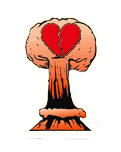
A few quick Manga notes
I bought this month’s
Wired magazine as it has a couple of articles on Manga, the first is called “Japan Inc.” by Daniel Pink. The article gives a brief overview of Japanese comics (which any passing manga fan would know) and delves into the fact that unlike the United States, the comic industry is the core of the entire Japanese pop culture machine. That’s right, video games, movies, cartoons, books and even music to some extent all rely on a healthy comics environment. The trouble is that Manga readership is down in Japan. The numbers are still huge of course when compared to the US, but this flatline of readership can lead to big problems for Japan’s entertainment empire. But, in the Article, Pink talks about the one area of comics that’s growing and that’s dojinshi or non-professional comics. Fans with professional level skill make these dojinshi comics and usually use established “copyrighted” characters as their topics. Think about it. It would be like an American fan creating stories about Batman and Spiderman. Want a tale with Superman and Batman as lovers? Or how about Wonder Woman getting married to Howard the Duck and going domestic? That’s what dojinshi creators do and the Publishing companies don’t go after them because they don’t want to crush the creative spark that’s central to manga. They only thing I can think of that’s similar in the states is that Paramount says it won’t sue trekkies that make fan films. Fans films that don’t make money… in Japan dojinshi are actually bought and sold. Amazing.
The second article is titled “How Manga Conquered America.” It’s a nice little history lesson presented in the actual manga format. Yes, its worlds and pictures, but it’s also read right to left. So the reader has to follow the 10-page story just like a kid reading the latest issue of
Fruits Basket. See the article educates the reader with the format along with the information. Most of the info in the article, again, is common knowledge to manga fans but for folks interested in this comic book phenomenon that has exploded in the US, it’s a great primer. The two most important facts that one can take away from the article are that there were several attempts to get manga into the States, all of which failed until publishers decided to skip the comic book store and go directly to the bookstore. The second fact is that Amime, adapted from manga, paved the way for the source comics to reach Americans. These comics were “cool” and they didn’t have the inherent geekyness of their American counterparts (whether that’s really true or not).
On another note, since I had a gift card burning a hole in my pocket, I picked up an
Osamu Tezuka manga titled “
Apollo's Song.” It’s a nice companion piece to Tezuka’s Phoenix comics. A short blurb I found on the web
Plot Summary: Chikaishi Shogo is a young man who hates the concept of love, and has never known what it means to be truly loved. Due to a course of shock therapy he dreams that he's taken to various times and places by the goddess of love.
It can come off as a little preachy and strange, especially the WWII sequence, but if you read Apollo's Song with your heart and not your head, it’s clearly a great effort by the Godfather of Comics. Love is the main theme here but its explored in a way that fans of Buddha and Phoenix would gravitate to. I also like that fact that Tezuka again validates that science fiction is useful and even a necessary genre to explore what it means to be human.
To be honest it took me a while to get into some of Tezuka’s work, except for
Black Jack, which I immediately devoured (and sadly is rarely published in English), because of the whole big eyes thing. For me, it tended to make the work look childish and it jarred with the seriousness of the topics Tezuka delt with. But as time has gone on, I’ve grown accustomed to it. One, because Tezuka was the originator and two, thanks to Stan Sakai’s
Usgai Yojimbo, which has a high cuteness factor but a deep, layered storytelling style, I realized cute isn't so bad.
Japanese comics are on my mind because soon I’m a taking trip to Japan. It’s under unhappy circumstances, but my SO and I are going to make the best of it. It will be rushed, so my glorious plans to "meet and greet" people and see all kinds of manga related things will have to be on put on hold for another visit. Family first.
-Swinebread







